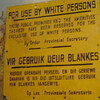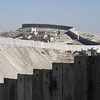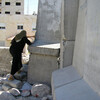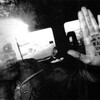
***Image1***Over the years, Israel established a number of settlement points in and around the Old City of Hebron, which had traditionally served as the commercial center for the entire southern West Bank . Israeli law-enforcement authorities and security forces have made the entire Palestinian population pay the price for protecting Israeli settlement in the city. Read more about Report: Israel's Separation Policy and Forced Eviction of Palestinians from Hebron

Eight Israeli human rights organizations petition High Court of Justice: order is legal basis for targeted, systematic, institutional discrimination, amounting to apartheid. The organizations demand to abolish the order supposed to take effect on January 19. The order issued by OC central command, Major General Yair Naveh, forbids Palestinians to travel with Israelis and internationals in their vehicles within the West Bank. The organizations are demanding the HCJ abolish the order and issue an interim order postponing the implementation of the order until it has ruled on the matter. Read more about "Abolish order forbidding Israelis and foreigners to travel with Palestinians"

The Supreme Court, in response to a petition submitted by ACRI, issued a precedent – setting ruling calling for the dismantling of an existing section of the barrier, and for the determination of an alternative route to lessen the impact on, and violation of, the rights of the resident Palestinian civilians. The petition was submitted on behalf of five villages that are currently trapped in an enclave created by the existing route of the barrier. In response to the petition: the Supreme Court ordered, for the first-time, the dismantling of a section of the separation barrier, and related to the legal relevance of the advisory opinion issued by the International court of Justice in The Hague. The ruling called for the dismantling of the section of the barrier surrounding the Alfei Menashe enclave. The resultant enclave, which was created by the route of the barrier, has a disastrous impact on the lives of its Palestinian residents and cuts them off from the rest of the West Bank, public services, and family ties. Read more about Second Israeli High Court ruling Separation Wall

The Association for Civil Rights in Israel (ACRI) and Physicians for Human Rights-Israel petitioned the High Court of Justice yesterday against the Minister of Health, the Minister of National Infrastructure and the Minister of the Interior, and demanded to connect the child�s house to the national electric grid and provide her house with electricity on a regular basis. The petition was written by Attorney Sonia Boulos from the Association for Civil Rights in Israel. Three-year-old Enass from an unrecognized village in the Negev, where the Al-Atrash family resides, was diagnosed in January 2005 with a form of cancer-Rhabdomyosarcoma - which was detected in her chest cavity. The cancer was diagnosed at a very late stage and, as a result, doctors had to treat it with aggressive chemotherapy followed by surgery. Read more about Failure to connect home of Palestinian child diagnosed with cancer to electricity may result in risk to her life

The Association for Civil Rights in Israel submitted a petition to the Supreme Court on 2.6.05: The route of the separation barrier around the village of Ni’ilin was not determined by security considerations but in order to allow the expansion of the settlement of Hashmona’im. The planned route separates the residents of Ni’ilin from half of their agricultural land, and is liable to severely undermine their livelihood. Attorney Pinchuk rejects claims by the state that the route of the barrier surrounding Ni’ilin is a result of security concerns. In order to ensure the security of the Jewish settler community, he adds, other steps can be taken such as expanding the existing defensive system currently used to protect the settlement. Read more about Route of barrier designed to allow settlement expansion

The Association for Civil Rights in Israel submitted to the Supreme Court a statement of opinion: the ruling issued by the International Court of Justice in The Hague is binding to Israel; If the barrier is required it should coincide with state borders. The route of the separation barrier that has been constructed, the majority of which is located within the West Bank represents a clear violation of international law, as determined by the International Court of Justice in The Hague (ICJ), and therefore the route must be amended – as required – to adhere to the country’s borders. This was the explicit position voiced by ACRI in its statement of opinion that was submitted today to the Supreme Court. Read more about Separation Barrier route violates international law

In response to a written appeal by ACRI’s Chief Legal Counsel Dan Yakir for an immediate repeal of the unpublished government decision to extend the Absentee Property Law to East Jerusalem and the surrounding villages, Israel’s attorney-general Menachem Mazuz made clear that he had no knowledge of the decision and had never been informed of its existence. He further added that the issue is under urgent consideration and that he will issue a statement regarding his position within the next few days. Read more about East Jerusalem land confiscation considered anew

In response to a petition submitted by the Association for Civil Rights in Israel and Rabbis for Human Rights. The state requested two weeks in which to prepare a response to the demand to allow Palestinian farmers free access to their land every day, and protection against attacks by settlers. During the hearing the petitioning organizations agreed to provide the IDF a list of all the Palestinian villages in need of security to harvest their olive crop, and the IDF officers stated their commitment to make the necessary arrangements to secure the harvest, while protecting Palestinian farmers from attacks by settlers in areas it is required. Read more about Israel's Supreme Court: Israel should provide security for West Bank olive harvest

The Association for Civil Rights in Israel submitted a petition this morning on behalf of Mordechai Vanunu against the prison warden of the Shikma Prison in Ashkelon and the Defense Ministry’s chief of security, to demand the return of documents and letters that were confiscated from Mordechai Vanunu, Israel’s nuclear whistle blower, before he was released from jail. The petition was submitted by ACRI’s chief legal counsel, Attorney Dan Yakir, referring to legal material and copies of letters from Vanunu wrote during his seventeen and a half years of imprisonment. Read more about ACRI demands return of documents and letters confiscated from Vanunu

The Supreme Court issued a precedent-setting ruling yesterday (1/9/04) stating that the right of prisoners or detainees to meet with their attorneys must be ensured, also for those who are on a hunger strike. The Supreme Court also established that the refusal by the IPS to allow such meetings to take place, as the state legal counsel admitted, was illegal. The Supreme Court granted the status of a judicial ruling to the state undertaking to facilitate, from this point on, meetings between prisoners and detainees who are on a hunger strike and their attorneys. Read more about Hunger striking prisoners allowed to meet with their lawyers









